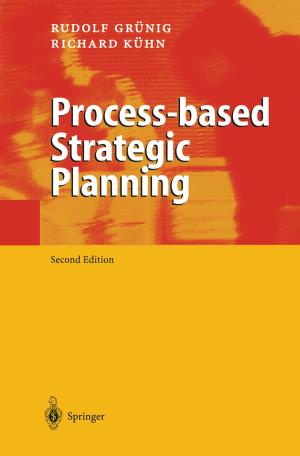Enterprise Risk Management Models
Business & Finance, Industries & Professions, Insurance, Management & Leadership, Production & Operations Management| Author: | Desheng Dash Wu, David L. Olson | ISBN: | 9783662537855 |
| Publisher: | Springer Berlin Heidelberg | Publication: | January 2, 2017 |
| Imprint: | Springer | Language: | English |
| Author: | Desheng Dash Wu, David L. Olson |
| ISBN: | 9783662537855 |
| Publisher: | Springer Berlin Heidelberg |
| Publication: | January 2, 2017 |
| Imprint: | Springer |
| Language: | English |
This book is a comprehensive guide to several aspects of risk, including information systems, disaster management, supply chain and disaster management perspectives. A major portion of this book is devoted to presenting a number of operations research models that have been (or could be) applied to enterprise supply risk management, especially from the supply chain perspective. Each chapter of this book can be used as a unique module on a different topics with dedicated examples, definitions and discussion notes.
This book comes at a time when the world is increasingly challenged by different forms of risk and how to manage them. Events of the 21st Century have made enterprise risk management even more critical. Risks such as suspicions surrounding top-management structures, financial and technology bubbles (especially since 2008), as well as the demonstrated risk from terrorism, such as the 9/11 attack in the U.S. as well as more recent events in France, Belgium, and other locations in Europe, have a tremendous impact on many facets of business. Businesses, in fact, exist to cope with risk in their area of specialization.
This book is a comprehensive guide to several aspects of risk, including information systems, disaster management, supply chain and disaster management perspectives. A major portion of this book is devoted to presenting a number of operations research models that have been (or could be) applied to enterprise supply risk management, especially from the supply chain perspective. Each chapter of this book can be used as a unique module on a different topics with dedicated examples, definitions and discussion notes.
This book comes at a time when the world is increasingly challenged by different forms of risk and how to manage them. Events of the 21st Century have made enterprise risk management even more critical. Risks such as suspicions surrounding top-management structures, financial and technology bubbles (especially since 2008), as well as the demonstrated risk from terrorism, such as the 9/11 attack in the U.S. as well as more recent events in France, Belgium, and other locations in Europe, have a tremendous impact on many facets of business. Businesses, in fact, exist to cope with risk in their area of specialization.















